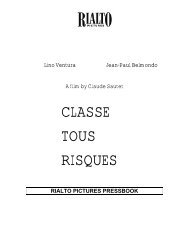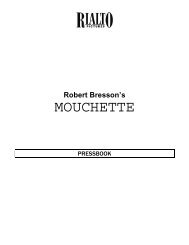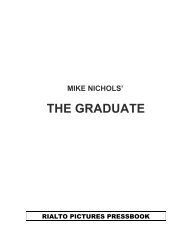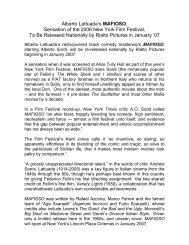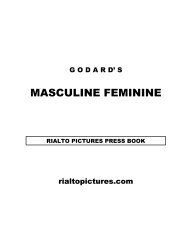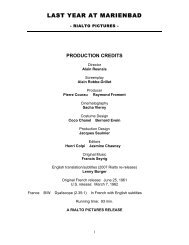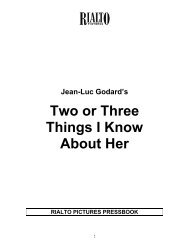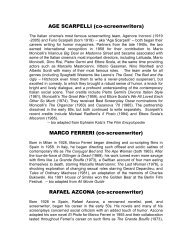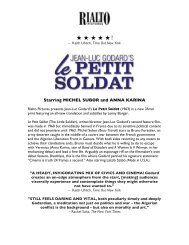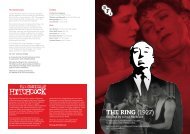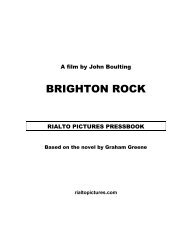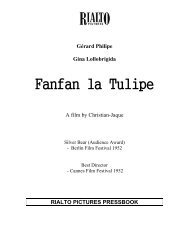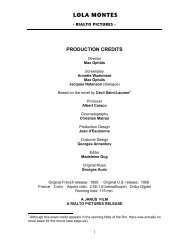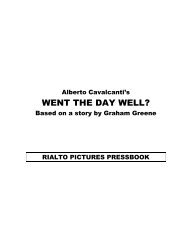Jean-Luc Godard's Two Or Three Things I Know ... - Rialto Pictures
Jean-Luc Godard's Two Or Three Things I Know ... - Rialto Pictures
Jean-Luc Godard's Two Or Three Things I Know ... - Rialto Pictures
Create successful ePaper yourself
Turn your PDF publications into a flip-book with our unique Google optimized e-Paper software.
Elle (Her) is a well defined and precisely described woman: Marina Vlady. But it<br />
is also a city (Paris) and its periphery, a city in the midst of transformation, a city<br />
completely overwhelmed by huge buildings and speculations as it hasn't been for<br />
over a hundred years, since the heyday of Baron Haussmann….<br />
The idea for <strong>Two</strong> or <strong>Three</strong> <strong>Things</strong> I <strong>Know</strong> About Her came to Godard via an<br />
investigation entitled "Prostitution in the High Rises," which appeared in the<br />
Nouvel Observateur in March and May of 1966. Is it the filmmaker or is it the<br />
investigator who gives us the social causes for this prostitution? A woman, in<br />
order to live and pay the rent, becomes a whore. She ends up marrying one of<br />
her lovers. They settle in a high rise, with all their household items having been<br />
bought on the installment plan. After a year or two of these "roses on credit," it's<br />
the husband himself who asks his wife to prostitute herself so that the monthly<br />
payments can be met.<br />
In <strong>Two</strong> or <strong>Three</strong> <strong>Things</strong> I <strong>Know</strong> About Her, a perfectly honorable mother, who<br />
perhaps does some acting when she feels like it, does a bit of "hustling" in Paris,<br />
either with or without the knowledge of her husband, who waits for her patiently<br />
in a Paris café, where he always manages to strike up a conversation.<br />
Before becoming a filmmaker, <strong>Jean</strong>-<strong>Luc</strong> Godard took courses in ethnography at<br />
the Musée de l'homme. One can still see traces of <strong>Jean</strong> Rouch in Godard, if one<br />
considers that, instead of studying the customs of the Blacks in Africa, he studies<br />
the lives of Parisian men and women of today.<br />
The more Godard advances in his work, the less place the novel has in his films.<br />
…<strong>Two</strong> or <strong>Three</strong> <strong>Things</strong> I <strong>Know</strong> About Her is related, particularly through<br />
<strong>Godard's</strong> commentary, to the comic strips. …The title of the film defines its<br />
content. It is not a question of saying everything about a woman or a city, or of<br />
defining and explaining them in some kind of logical diagram. Instead, only "two<br />
or three things" are said about "them," and it is up to the audience to complete<br />
the puzzle by imagining a past and a future for them, whereas only a few<br />
fragmentary aspects of their present are given…<br />
…Chaplin was so enthused over <strong>Two</strong> or <strong>Three</strong> <strong>Things</strong> I <strong>Know</strong> About Her that he<br />
referred to it as "one of the most beautiful symphonies I have ever heard." Let us<br />
hope that this unique symphony of noises and colors created by Godard will<br />
arouse similar enthusiasm, and particularly that it will be understood by the<br />
general public, which is all too often confused by novelty, by these two or three<br />
things which make up a part of a grand ensemble that is both contemporary<br />
France and the work of Godard.<br />
--Excerpted from Focus on Godard, Edited by Royal S. Brown (1972, Prentice-<br />
Hall)<br />
12



